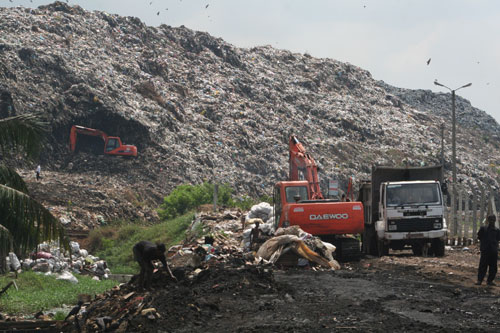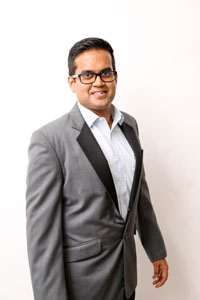‘Mr. Kunu’ gets a kick out of ensuring nothing goes to waste
View(s):
File picture of a garbage dump.
He was introduced as ‘Mr. Kunu’ at a recent seminar at the British Council where five game changers talked about social change through social enterprise.
Chinthaka Abeysekera lives up to that name. No, he is well-groomed and his presentation was full of substance not rubbish – although that last word is what will make him a millionaire soon. That is if the calcified bureaucracy in this country gets their act together and helps him to realise his dream of creating a green environment for all of us to live in.
Chinthaka, 31, is chief executive of EnCare, a company which is deeply involved in the disposal of clinical waste. He also wants to get into the business of general waste disposal – an issue which has relevance to all of us especially when the garbage men don’t turn up to collect the refuse at home.
But let’s first talk about clinical waste disposal as Chinthaka has already set up an operation (EnCare) which is delivering a vital service to hospitals in Colombo and elsewhere.
After finishing his studies at Asian International School, Chinthaka went to New Jersey in the US to do a degree in electrical engineering and technology. Soon after successfully completing his degree, he joined Thomson Reuters as an application engineer and then being bumped up to junior project manager. Life was comfortable living in the Big Apple and he earned plenty of disposable bucks, had a car and an apartment. Yes, there is a ‘But’ at this juncture of the story.
“But I was not happy being a nine to five guy. Thomson Reuters had around 50,000 employees and I was just a small bolt in that huge machine. I didn’t want to be like that,” recounts Chinthaka who packed his bags and returned home late in 2010.
Earlier plans
“At this point I wanted to do a Master’s in Business Administration but I realised that what is the point of doing a Master’s if I didn’t know what business administration is all about. So the plan was to return home, work for two years with some businesses and see what it is all about,” he related.
Chinthaka joined his father’s company which dealt in healthcare products, selling everything from equipment to pharmaceuticals. He was told to start at the lowest rung.
“My dad told me that if I was to learn the trade, I would have to start from the bottom. So I became a medical rep and I hated it having to go from door to door selling stuff,” Chinthaka reminisced.

Chinthaka Abeysekera
But it was while he was doing it that a door, which he never thought he would go through, opened. One day, early in 2011, Chinthaka had to go the Maharagama Cancer Hospital to meet a doctor. He was trying to flog a machine that could detect cancer in the colon and intestines. While trying to take a short cut through the maze-like hospital, he got lost and asked a janitor for directions.
“I also noticed yellow bags of muck piled up near a big drain. I then asked the cleaning guy what this was and he said it was all the clinical waste waiting to be picked up by the ‘kunu karayas’. I was shocked that such hazardous material was being disposed like this. Having lived for almost 10 years in the States, you are extra-sensitised, and I was like “Oh God, I must do something about this’.”
As he had no clue about clinical waste disposal – everything from wound dressing, gloves, syringes, needles, plastic tubing, sutures, blood-soiled linen and cotton, etc – Chinthaka approached the problem clinically. He was introduced to the Institute for Applied Material Flow Management (IfaS) in Germany, one of the few universities in the world which is carbon plus and contributes to a green environment. He began the journey of learning about sustainability while looking into solutions. It took him more than a year to study the technology, understand the pros and cons, and all this while working as a medical rep.
“It was an education and training on the job. I was also lucky to be linked up with the Waste Management Authority in Colombo who introduced me to a Korean company in waste disposal who are now my partners at EnCare.”
Korean technology
The Koreans provided the technology. Chinthaka verified it with IfaS whether such a system would work in Colombo. The green light was given by the Germans. Now all he needed was funds to get the project off the ground.
At the British Council seminar, Chinthaka highlighted one of the biggest problems facing start-ups was funding from banks. “The banks wanted collateral. This is the biggest drawback for any start-up company in Sri Lanka, or anyone who has an idea,” Chinthaka points out.
Luckily for him, he had a property which he mortgaged. Yet that was insufficient to meet the seed capital of Rs. 30 million. His Korean partner helped him out with a grant which helped bridge the balance.
“In Korea you have agencies which allow their companies to go to other countries and use their technology in. I got a grant, thankfully, and was able to come up with the funding for my project. Any start-up faces risks but you cannot disrupt in this country without the proper funding mechanisms in place. There has to be a change in the system which is so archaic,” says Chinthaka.
Clinical waste in Sri Lanka now belongs to the Ministry of Health. The municipal waste is the responsibility of the local authorities. At the time he stumbled onto the pile of yellow bags inside the Maharagama Cancer Hospital, it was the municipal authorities who were handling the disposal – the former Defence Secretary thankfully changed the system – and dumping it at the two main rubbish dumps for the city in Meetotamulla and Piliyandala.
They were burning these hazardous material releasing toxic fumes into the air. This seems to be the practice even at some hospitals which have incinerators on their premises. If you see black smoke coming out of the chimney, it is not because the Pope has not been chosen as yet, but rather poisonous emissions seeping into the city air.
Learning about the disposal of clinical waste, Chinthaka discovered that there are two ways to do it. The first being autoclaving, a non-thermal process which is almost like a washing machine which sterilises the waste and the second being incineration.
“There are pros and cons of both methods. The issue that we have with autoclaving is you need a sanitary landfill that is willing to accept the sterilised waste, and another problem is volume reduction is very little. In Sri Lanka there is no sanitary landfill which accepts clinical waste.”
Incineration
Because the infrastructure is not geared for autoclaving he opted for incineration. “The good thing about this process is there is a straight up volume reduction. If you put in 1000 kilograms of clinical waste then only 10 per cent comes out as ash and there is no question about the sterility of that ash because it is burned in high temperatures.
“But the downside is there is a shift of pollution to the environment for when you burn you get smoke. So the question is can you clean this smoke.
We are the first company in Sri Lanka that has brought a complete flue-gas treatment system.”
A pilot project was set up in 2014 at the Colombo East Base Hospital in Mulleriyawa. Around 50 perches were allocated for the project and EnCare set it up. The capacity was five metric tons and the goal was to treat clinical waste from 10 hospitals. It worked like a dream. The hazardous waste products from Maharagama Cancer Hospital and elsewhere were being disposed safely. He gets a service charge for every kilogramme of waste handled. He provides everything from picking up and transporting the waste to disposing the ash residue. It’s an A to Z service.
Later in 2014, Chinthaka put in the papers calling for commercial expansion.
Until now, that goal hasn’t been accomplished mainly due to bureaucratic lethargy and ineptness. And he finds himself stuck between a rock and a hard place – more hospitals are sending in their clinical waste (waste coming in has been tripled) while the commercial expansion is on hold.
“I’m providing a vital service but I can’t provide an international standard service right now because I need to expand. After a certain volume, we can’t manually handle it. For higher volumes you have to become automated or else the risk of recontamination is high.
“Right now we use a wet flue-gas system but this does not suit Sri Lanka as our waste segregation at hospitals is bad. It is very difficult to control what goes into the system. The only way out is to do the expansion,” Chinthaka stressed.
It has been a learning process for Chinthaka. Being the first to bring down this technology he has found out that what might suit Korea might not be the best for Sri Lanka.
Knowledge transfer
“That is the knowledge transfer, knowing what suits us best and customising it for our conditions. Our technical team has been able to customise certain aspects of the technology to adapt to our conditions. When we designed our plant we designed it on the acidic emissions in Korea. In Sri Lanka the acidic emissions are much higher, perhaps because we buy cheaper syringes, gloves and so on. So our systems have to be more stringent that that in Korea.
“The last two-and-a-half years we have been learning what to do and what not to do. Now we are ready,” Chinthaka promised. New machinery from Germany has been picked for the new plant with two acres given by the government at Muthurajawela. He is now in the process of looking for investors who can pump in US$4 million. Fingers-crossed, the expansion will be up-and-running by next year.
Is this a rags (rubbish) to riches story? Maybe it is. But as far as Chinthaka is concerned, he hopes he can make the world a better and safer place. “If someone had told me I would end up being in waste management, I would have laughed. But I get a kick out of doing this and I really believe I’m the one who can do it,” says Chinthaka as he looks forward to getting involved in the waste to energy business too. But that is another story. (AS)


